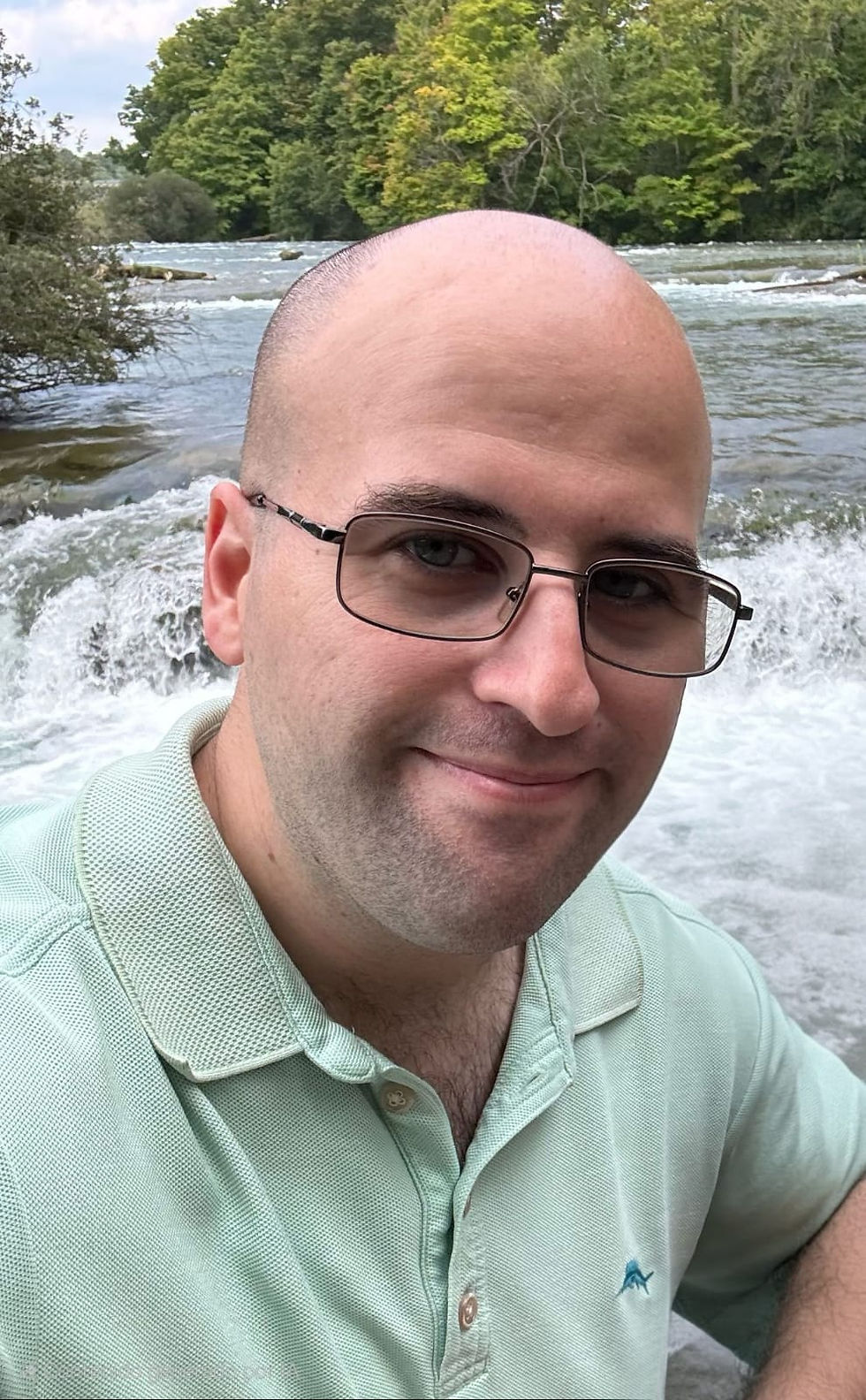Rutgers: Congratulations to Kyle Skalenko, PhD!
- Ray Sullivan

- Mar 10, 2025
- 3 min read

Kyle S. Skalenko successfully defended his PhD dissertation on Thursday, March 6, 2025. He delivered an insightful and rigorous defense of his doctoral research at the Waksman Institute, Rutgers University. The defense was held online and attended by faculty, colleagues, friends, and family, all eager to celebrate this major academic milestone.
Dr. Skalenko's dissertation, conducted under the mentorship of Dr. Bryce Nickels, focused on elucidating the mechanistic and biological significance of primer-dependent transcription initiation in Escherichia coli. This work addresses fundamental questions about how bacteria initiate transcription using RNA primers rather than conventional nucleoside triphosphates. His research not only identified key promoter sequence determinants for primer-dependent transcription initiation but also revealed how RNA primers affect initial transcription pausing and downstream RNA stability. This groundbreaking work has broad implications for our understanding of bacterial gene regulation and may even inform the development of novel antimicrobial strategies.
Through a series of innovative experiments, Dr. Skalenko demonstrated that RNA primers increase the stability of transcripts in E. coli, which has significant physiological consequences. His findings extended beyond the test tube and into real-world biological systems, showing that mutations disrupting primer-dependent transcription initiation impact biofilm formation. This insight could influence future studies on bacterial persistence and infection, as well as food safety.
Dr. Skalenko's work is distinguished by his mastery of cutting-edge methodologies, including high-throughput sequencing (RNA-seq and ribosome profiling), advanced biochemical assays, and in vivo genome manipulation. His interdisciplinary approach, combining molecular biology, biochemistry, and computational analysis, highlights the complexity and elegance of bacterial transcriptional regulation. His dissertation committee included eminent faculty from Rutgers University: Dr. Bryce Nickels (advisor), Dr. Gerben Zylstra, and Dr. Srujana (Sam) Yadavalli, as well as Dr. Jeremy Bird from the University of Delaware.
Dr. Skalenko's academic journey spans over a decade of dedication to microbiology. With a B.A. in Biochemistry and Molecular Biology from Rutgers University where he was an undergraduate researcher in Richard Ebright’s lab. He stayed at Rutgers to pursue his PhD in the Microbial Biology program. Over the years, he has held roles as a teaching assistant, lab manager for Sam Yadavalli and Premal Shah, and graduate assistant and research project assistant in Bryce Nickel’s lab. He also did a stint as a Scientist for Specialty Assays, Inc. in Manville, NJ. His extensive technical expertise ranges from molecular biology and genomics to organic synthesis and bioinformatics. Beyond the laboratory, he has demonstrated a commitment to scientific communication and mentorship, helping to guide and inspire the next generation of microbiologists.
His research has already resulted in several peer-reviewed publications, including a pivotal 2021 paper in the Proceedings of the National Academy of Sciences detailing the promoter-sequence determinants of primer-dependent initiation. Dr. Skalenko's ability to bridge fundamental science with practical applications underscores the real-world relevance of his work. Other notable publications include:
• Favate JS., Skalenko KS., Chiles E., Su X., Yadavalli SS., Shah P. (2023) Linking genotypic and phenotypic changes in the LTEE (Long Term Evolution Experiment) using metabolomics. eLife. https://doi.org/10.7554/elife.97039.1
• Cope AL, Vellappan S, Favate JS, Skalenko KS, Yadavalli SS, Shah P. (2022) Exploring ribosome-positioning on translating transcripts with ribosome profiling. Methods Mol. Biol. 2404:83-110. doi: 10.1007/978-1-0716-1851-6_5 https://link.springer.com/protocol/10.1007%2F978-1-0716-1851-6_5
• Pukhrambam C, Molodtsov V, Kooshbaghi M, Tareen A, Vu H, Skalenko KS, Su M, Zhou Y, Winkelman JT, Kinney JB, Ebright RH, Nickels BE. (2022) Structural and mechanistic basis of sigma-dependent transcriptional pausing. Proc. Natl. Acad. Sci. U.S.A. 119 (23) e2201301119 https://www.pnas.org/doi/10.1073/pnas.2201301119
• Chandra KB, Skalenko KS, Agrawal A, Sivaneri N, Thiry M, Chundawat S PS. (2021) Engineered regulon to enable autonomous azide ion biosensing, recombinant protein production, and in vivo glycoengineering. ACS Synth. Biol. 10(4): 682-689. doi: 10.1021/acssynbio.0c00449 https://pubs.acs.org/doi/10.1021/acssynbio.0c00449
• Druzhinin SY, Tran NT, Skalenko KS, Goldman SR, Knoblauch JG, Dove SL, Nickels BE. (2015) A Conserved Pattern of Primer-Dependent Transcription Initiation in Escherichia coli and Vibrio cholerae Revealed by 5′ RNA-seq. PLoS Genet 11(7): e1005348. https://doi.org/10.1371/journal.pgen.1005348
Kyle also authored a patent application for developing biosensors for selectively identifying azide ions. The invention utilizes engineered genetic systems, specifically within E. coli, that respond to the presence of azide. Upon detection of azide, these systems trigger the expression of a reporter protein, such as GFP, allowing for visual or quantifiable identification. Bandi, Chandra Kanth, Shishir Chundawat, and Kyle S. Skalenko. "Biosensors for selectively identifying azide ions." U.S. Patent Application 18/010,109, published September 7, 2023.
As he prepares to embark on the next chapter of his scientific career, there is no doubt that his contributions will continue to shape our understanding of microbial physiology and gene regulation.
We celebrate Dr. Skalenko's remarkable achievements and the successful completion of his PhD. This accomplishment reflects years of perseverance, intellectual curiosity, and scientific innovation. We wish him continued success in his scientific career and look forward to seeing the lasting impact of his research in the field of microbial biology. Congratulations, Dr. Skalenko!










Congratulations!